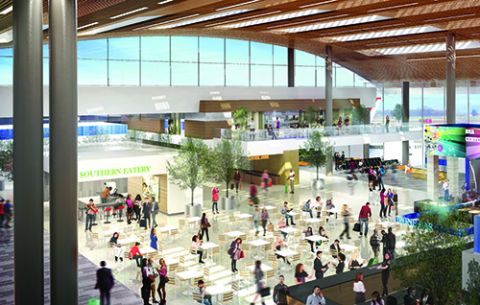Nashville Int’l Uses Developer Model to Add Local Concessions & Street Pricing

Visitors at Nashville International Airport (BNA) will have new and more diverse food/beverage and retail options in the new year. The concessions update focuses on adding locally authentic options and signals a change for the Tennessee airport that serves 14.9 million passengers annually.
 The Metropolitan Nashville Airport Authority awarded a 10-year concessions contract to developer Fraport USA in August 2018. Under the auspices of the Authority, Fraport will handle the design, construction, lease and management of about 108,000 square feet of concessions space once the program is fully developed in 2023. Leases and construction are set to begin in February 2019, with openings slated for later in the year.
The Metropolitan Nashville Airport Authority awarded a 10-year concessions contract to developer Fraport USA in August 2018. Under the auspices of the Authority, Fraport will handle the design, construction, lease and management of about 108,000 square feet of concessions space once the program is fully developed in 2023. Leases and construction are set to begin in February 2019, with openings slated for later in the year.
Doug Kreulen, president and chief executive officer of BNA, emphasizes that local restaurateurs and retailers will independently own and manage their brands at the airport.
|
Project: New Concessions Location: Nashville Int’l Airport Scope: Approx. 108,000 sq. ft. once program is fully developed in 2023 Contractor: Fraport USA New Strategies: Developer model; street pricing; increased involvement by local businesses, products & services Term of Contract: 10 yrs Associated Investments: $17.4 million by Fraport; $30 million-$40 million from subtenants Timeline: Leases & construction begin Feb. 2019; new concessions slated to open later same year Contractor Design Consultant: LGA Partners 2018 Customer Satisfaction Survey: Phoenix Marketing Int’l |
This is a distinct change for the airport. The previous concessions model generally did not encourage independent, local ownership of food/beverage and retail shops. Another new policy, “street pricing,” requires concessionaires to price items at levels equivalent to what consumers/passengers would find for the same items at similar locations outside the airport.
The idea is to harness home-grown talent, taste, authenticity and enthusiasm to invigorate BNA’s food/beverage and retail shops. Increased sales will then provide another source of fuel, so to speak, to power the airport’s economic and employment engine for Nashville and the surrounding region. Announcements about what businesses will be coming to BNA are expected within several months.
Why change strategies now? As Kreulen puts it, “It was perfect timing. Our existing master concessions contract was expiring, and we were looking for an opportunity to improve customer service and increase participation from local and Airport Concessions Disadvantaged Business Enterprises (ACDBE).”
Ben Zandi, president and chief execution officer with Fraport USA, says that the “reimagined program” for the airport will elevate the customer experience for retail and dining throughout reinvigorated areas of the facility. Moreover, he feels that the new approach will amplify BNA’s role as an airport that “reflects our city’s warm and welcoming environment.”
A Time of Change
The concessions initiative is also a sign of other changes unfolding at the airport—namely a $1.2 billion growth and expansion plan called BNA Vision. The plan is implementing projects designed to “keep BNA a world-class airport for a world-class city.” Major elements include a new parking/transportation center and expansion projects in Concourse D, the ticketing lobby and baggage claim areas.
Growth in the region’s overall population and BNA’s passenger volume is driving it all. Airport officials expect traffic to grow from about 15 million passengers now to at least 23 million by 2037, an increase of roughly 50%.
Within that context, the concessions initiative is a shift in direction that, in many respects, leads right back to BNA’s locale. Nashville businesses, with their cuisine, beverages, services and products, will bring the unique character of the city and its region to millions of travelers each year.
Fraport USA, previously known as Airmall, works with numerous U.S. airports to introduce branded retail programs and street pricing models. The company has developed and is managing retail and food/beverage operations at Baltimore/Washington International Thurgood Marshall Airport, Cleveland Hopkins International, Pittsburgh International and JetBlue’s Terminal 5 at John F. Kennedy International Airport.
 “At all of our programs, we seek to lease to local businesses,” Zandi remarks. “We believe that the airport should reflect the sight, sound and flavor of the city and neighborhood. The airport should be an economic engine for the local community and businesses, therefore the profit will stay in the city…We are making the program accessible to businesses big and small. Every single concession space will be available to single operators.”
“At all of our programs, we seek to lease to local businesses,” Zandi remarks. “We believe that the airport should reflect the sight, sound and flavor of the city and neighborhood. The airport should be an economic engine for the local community and businesses, therefore the profit will stay in the city…We are making the program accessible to businesses big and small. Every single concession space will be available to single operators.”
He sees the shift occurring at BNA as an example of a larger trend. “In our industry, it’s common to put together large packages of space and lease that space to large companies,” Zandi explains. “It’s efficient and relatively quick. However, making the program available to more great businesses of Nashville will lead to an authentic and uniquely Nashville experience for the travelling public. This is a key component of [the Authority’s] BNA Vision.
“The response has truly been humbling,” he continues. “We received over 425 proposals for space in the airport, with the vast majority having a strong local and ACDBE component.”
Appetite for Innovation
“One of the most exciting aspects of this project is that it’s coming at a time of expansion that is shaping the future of airports and airport concessions,” says Vivica Brown, Fraport USA’s vice president of operations for the BNA program. Brown, an airport and financial services veteran who joined the company in November 2018, reports that there is an appetite for innovation and transformation within the industry. “Dynamic retail and food and beverage programs play a huge part in enhancing the passenger experience and providing a sense of place,” she says.
 Creating a sense of place at BNA has been a multi-pronged process. The arrival of new airport authority board members and Kreulen’s appointment as chief executive in December 2017 coincided with a growing awareness of the need to examine BNA’s customer service.
Creating a sense of place at BNA has been a multi-pronged process. The arrival of new airport authority board members and Kreulen’s appointment as chief executive in December 2017 coincided with a growing awareness of the need to examine BNA’s customer service.
In a related development, there were interesting findings in BNA’s standard customer survey, which was conducted by Phoenix Marketing International. The survey showed that food/beverage and retail was performing at 20% below other categories within the airport. According to the survey, passengers see BNA as well above average. In fact, its overall satisfaction score of 94% towers above the firm’s 85% nationwide airport benchmark. Concessions, however, lagged behind, with approvals in the low- to mid-70th percentile, Kreulen reports.
Those findings acted as starting blocks for a series of actions. “We did a complete look at all concessions models,” recalls Kreulen. Eventually, airport officials found that the developer model held the most promise. “We believe the developer model will give us increased sales, improve customer service, create a sense of place about Nashville and allow for more local and ACDBE participation,” he remarks.
While the original goal for participation by disadvantaged businesses is 22.6%, Authority officials estimate that the new concessions agreement will ultimately produce ACDBE participation of 40% over the life of the contract. Furthermore, Kreulen notes that competition among vendors will inherently create better customer service.

That said, some concerns were raised about whether there would be enough local interest and whether local businesses could handle the additional requirements of working in an airport environment. Given the board’s nine-to-one approval of switching to the developer model, such concerns were apparently allayed.
“Once the investment is fully realized, we will have invested $17.4 million in the program, with a further $30 to $40 million invested by the individual subtenants,” Zandi shares. Fraport USA will upgrade space and build concessions areas in terminals A, B and C; subtenants will build their own spaces within those areas, “just as they would on the street,” says Zandi. “We guide subtenants through the design, permitting and construction process; however, they are free to use any licensed contractor they choose.”
 Fraport hired architectural firm LGA Partners for design services. Updated artwork, selfie stations and other new amenities are planned once the concessions redevelopment is completed, says Brett Kelly, a Fraport vice president.
Fraport hired architectural firm LGA Partners for design services. Updated artwork, selfie stations and other new amenities are planned once the concessions redevelopment is completed, says Brett Kelly, a Fraport vice president.
Renderings depict a sweeping, open space, unified in its forms and finishes. Individual units will likely include regionally themed eateries, clothing retailers and possibly a wine bar—all with distinctive looks.
A Look Ahead
Work to execute the plan continues. In November, the team convened its first meeting with the new Nashville Advisory Council, a group of local leaders and professionals from Nashville’s business, culture and thriving arts communities. In late November, the team released a solicitation for the food/beverage program and received active response. “We’ve been on the ground talking with local restaurant owners about this for months,” reports Zandi. “And over the next few weeks, we’ll be evaluating the responses in order to make a final recommendation to the airport authority.”
Whatever specific form the proposed program takes, the Authority will review Fraport’s plan to ensure that it meets the group’s larger strategic objectives.
Kreulen predicts that the new developer model BNA is using could become an industry trend. “It gives airports more local control of participation, management and, ultimately, the success of its concessions plan,” he reasons. “The moment you arrive at BNA, we want it to be clear that this is Music City, with all the sights, sounds and tastes the Nashville brand implies.”
Stakeholders clearly are enthusiastic about the new concessions model and other changes at BNA. As Fraport’s Brown says, “It’s an exciting time.”
FREE Whitepaper
Fairbanks International Airport Baggage Transport Conveyor Enhanced With Mod Drive™ System
Airports face a host of unique industry challenges, such as meeting efficiency regulations and seeking out the best maintenance practices to reduce costs and keep operations flowing. In today’s current economic climate, any potential cost savings can go a long way.
In 2019, Alaska’s Fairbanks International Airport (FAI) sought to modernize its equipment and operations. They were dissatisfied with the performance of the gearmotors on their baggage transport conveyors and began searching for new suppliers. Regal approached FAI with a solution that could improve equipment performance and simplify maintenance, with the added benefit of energy cost savings: the Hub City® MOD Drive™ system.
This white paper discusses the hardware deployed, the test results and the annualized expectations for ROI.
 facts&figures
facts&figures








